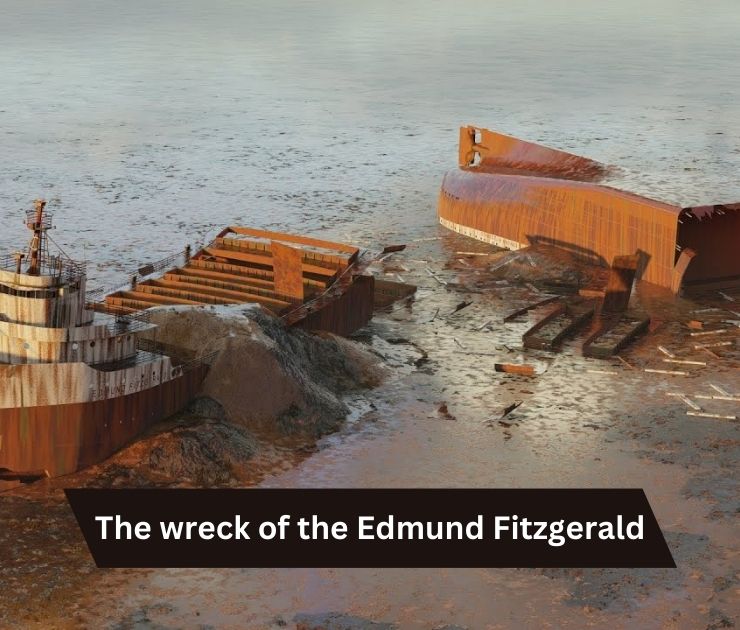The wreck of the Edmund Fitzgerald is not just a maritime disaster; it has become a haunting symbol of the Great Lakes’ treacherous waters and the human stories intertwined with them.
On November 10, 1975, this massive freighter sank during a fierce storm, taking with it the lives of all 29 crew members on board. The tragedy inspired Gordon Lightfoot’s iconic song, which has kept the memory of the ship and its crew alive for generations.
In this article, we will explore the events leading up to the shipwreck, the enduring legacy of the song, and why this story continues to resonate with audiences today.
You can also read: Suite Judy Blue Eyes
Introduction Of Gordon Lightfoot The Wreck Of The Edmund Fitzgerald
It is a haunting ballad that first emerged in 1976 as part of his album Summertime Dream. This poignant tribute to the ill-fated freighter, which sank in Lake Superior during a storm in 1975, showcases Lightfoot’s ability to weave storytelling with deep emotional resonance.
In 1988, he revisited this classic, re-recording it for Gord’s Gold, Vol. 2, further solidifying its place in folk music history.
The Wreck Of The Edmund Fitzgerald Story
It is not just a tale of maritime tragedy; it reflects the fierce power of nature and the human spirit’s resilience. On that fateful November night in 1975, the mighty freighter met its match against the unforgiving gales of Lake Superior, a body of water renowned for its unpredictable storms.
The loss of all 29 crew members aboard the Fitzgerald resonated deeply within the Great Lakes community and beyond, prompting a renewed examination of safety protocols in maritime navigation.
The Wreck Of The Edmund Fitzgerald Lyrics
“The legend lives on from the Chippewa on down
Of the big lake they call Gitche Gumee
The lake, it is said, never gives up her dead
When the skies of November turn gloomy
With a load of iron ore twenty-six thousand tons more
Than the Edmund Fitzgerald weighed empty
[Former version:] That good ship and true was a bone to be chewed
[Latter version:] That good ship and crew was a bone to be chewed
When the gales of November came early
The ship was the pride of the American side
Coming back from some mill in Wisconsin
As the big freighters go, it was bigger than most
With a crew and good captain well seasoned
Concluding some terms with a couple of steel firms
When they left fully loaded for Cleveland
Then later that night when the ship’s bell rang
Could it be the north wind they’d been feelin’?
The wind in the wires made a tattle-tale sound
When the wave broke over the railing
And every man knew, as the captain did too
‘Twas the witch of November come stealin’
The dawn came late and the breakfast had to wait
When the gales of November came slashin’
When afternoon came it was freezing rain
In the face of a hurricane west wind
When suppertime came, the old cook came on deck
Saying, “Fellas, it’s too rough to feed ya.”
[Former version:] At seven PM a main hatchway caved in
[Latter version:] At seven PM it grew dark, it was then
He said, “Fellas, it’s been good to know ya.”
The captain wired in he had water comin’ in
And the good ship and crew was in peril
And later that night when his lights went out of sight
Came the wreck of the Edmund Fitzgerald
Does anyone know where the love of God goes
When the waves turn the minutes to hours?
The searchers all say they’d have made Whitefish Bay
If they’d put fifteen more miles behind her
They might have split up or they might have capsized
They may have broke deep and took water
And all that remains is the faces and the names
Of the wives and the sons and the daughters
Lake Huron rolls, Superior sings
In the rooms of her ice-water mansion
Old Michigan steams like a young man’s dreams
The islands and bays are for sportsmen
And farther below, Lake Ontario
Takes in what Lake Erie can send her
And the iron boats go as the mariners all know
With the gales of November remembered
[Former version:] In a musty old hall in Detroit they prayed
[Latter version:] In a rustic old hall in Detroit they prayed
In the Maritime Sailors’ Cathedral
The church bell chimed ’til it rang twenty-nine times
For each man on the Edmund Fitzgerald
The legend lives on from the Chippewa on down
Of the big lake they call Gitche Gumee
Superior, they said, never gives up her dead
When the gales of November come early”
Conclusion
The wreck of the Edmund Fitzgerald serves as a poignant reminder of the dangers faced by maritime vessels navigating the Great Lakes. This tragic incident not only claimed the lives of 29 crew members but also sparked significant changes in safety regulations and ship design.
The ongoing interest in Fitzgerald’s story reflects our collective desire to understand the complexities of nature and human endeavor.











